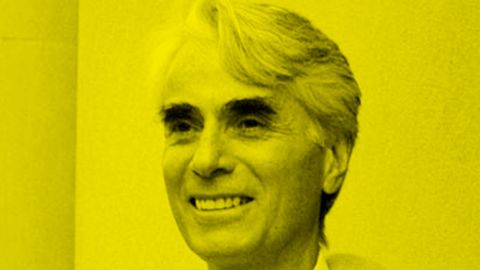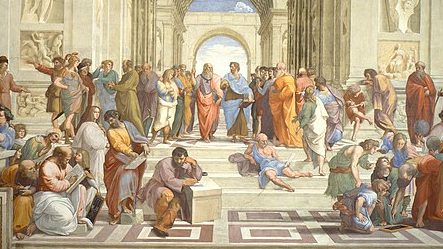Why Robert Nozick was a libertarian

We often fail to understand why people hold differing viewpoints from us. In our ever more diverse and interconnected world, however, we must try to do so. Today, we’ll look at Robert Nozick and his magnificent defense of libertarianism to try and understand why a person might support this ideology.
Who?
Nozick was a philosopher at Harvard. He worked in many different subject areas but he is arguably most well-known for his political work. As a young man he was a socialist, founding what would later become the Columbia branch of the Students for a Democratic Society before he fell in with a libertarian crowd and came to agree with their arguments.
After the publication of his colleague John Rawls’A Theory of Justice, which brilliantly argues for social democracy, Nozick was inspired to use similar arguments to promote his political positions. Appearing three years later, Anarchy, State, and Utopia (ASU) was Nozick’s only political philosophy book.
Where does he start?
He begins by advancing a straightforward premise, “Individuals have rights, and there are things no person or group may do to them (without violating their rights).” The rest of the book is spent determining what a state might be able to do without violating these rights.
What does he mean by “rights?”
Nozick’s idea of rights are protections against harm to us or our property. In this way they are negative rights, they assure us that other people won’t bother us and that we can claim compensation when they do, but they don’t obligate anybody else to do anything for us; like pay taxes which are turned into food stamps to assure those less fortunate of the right to eat.
Our having these rights means that it is wrong to hurt people or take their property for any reason unless they consent to such action, excepting when we are correcting for a previous violation of rights. Nozick argues that this premise leaves us with only one option when we’re deciding what kind of state is justified. He calls it a “minimal state” or the “night watchman state” and it is much, much, smaller than any functioning state is today.
What would the minimalist state be able to do?
Nozick explains that the night watchman state is “limited to the functions of protecting all its citizens against violence, theft, and fraud, and to the enforcement of contracts, and so on.” There would also not be any taxes in this state, as that would be forcing people to hand over their property with or without their consent.
It also would not be able to enact laws preventing people from making their own life choices or that force people to make ones that they don’t want to make.
Why does he think this so great?
Nozick argues, accurately, that people are different. Given this, he asks how we can build a society that works for a very diverse group of people:
Wittgenstein, Elizabeth Taylor, Bertrand Russell, Thomas Merton, Yogi Berra, Allen Ginsberg, Harry Wolfson, Thoreau, Casey Stengel, The Lubavitcher Rebbe, Picasso, Moses, Einstein, Hugh Hefner, Socrates, Henry Ford, Lenny Bruce, Baba Ram Dass, Gandhi, Sir Edmund Hillary, Raymond Lubitz, Buddha, Frank Sinatra, Columbus, Freud, Norman Mailer, Ayn Rand, Baron Rothschild, Ted Williams, Thomas Edison, H.L. Mencken, Thomas Jefferson, Ralph Ellison, Bobby Fischer, Emma Goldman, Peter Kropotkin, you, and your parents. Is there really one kind of life which is best for each of these people?
Since he presumes the answer is “no,” his stance is that you can only build a “meta-framework” that allows for a variety of people to pursue a variety of life plans. Because of this, the “utopia” that Nozick alludes to in the title is not one but many.
In the minimalist state, it will be possible for people to form utopian communities on their own without outside interference. Nozick claims that this is one of the greatest perks of a minimalist state, as it will allow people to choose communities that fit their lifestyle, create new ones, leave ones they don’t like, or avoid utopian dreams altogether without hassle.
Such utopian communities could be puritanical, hedonist, communist, capitalist, dedicated to eating cheese, or whatever else people think will make them happy. The minimalist state only assures that nobody is forced into these living situations, that nobody is forced to pay for these communities other than the people living in them, that any contracts signed are adhered to, and that nobody tries to harm or defraud the members of such groups.
The fate of each utopia is completely in the hands of the utopians.
But, why can’t we redistribute wealth or help the poor? What about stuff like NASA?
Nozick argues that any attempt to make the distribution of wealth fit a pattern that we like, such as making sure everybody has the same amount of money, would require tyrannical intervention by the state in our daily lives.
He gives us a famous example staring NBA legend Wilt Chamberlain to explain. He asks us to imagine a society that has perfected its wealth distribution, whatever that looks like, where people like to watch Mr. Chamberlain play basketball. For each ticket to a game he plays in that is sold, Wilt gets 25 cents. By the end of the basketball season, he would have gained a great deal of money and the perfect distribution of wealth we had is gone.
Nozick then asks how we can either get back to that distribution or maintain it for any length of time. He suggests that the only way to assure that the ideal distribution of wealth is maintained is to take draconian action, in this case telling people they can’t buy tickets to watch a basketball game, and that therefore justice theories that call for specific outcome patterns can’t be used in a free society.
He instead argues that the only just way to distribute wealth is “From each as they choose, to each as they are chosen” and letting the chips fall as they may, so long as nobody steals from anybody else.
In the case of big things like space exploration, Nozick points out that not everybody wants to pay for those things. Taking their money without their consent violates their rights as Nozick understands them. Of course, everybody in his minimalist state would be free to donate to charity to help solve social problems or to advance the goal of human space flight.
But why have a state at all? Wouldn’t no state be best if we want to make sure our rights are never violated?
Nozick spends a lot of time on this question. His answer is, in short, that a minimalist state can better protect rights than a stateless society could. He further argues that people in stateless societies would tend to create state-like entities over time and could do so without violating anybody’s rights.
How can a state come into being without violating people’s rights in the first place?
He argues that in a stateless society people will agree to pay agencies for services which will protect their rights. Over time, there will be an inevitable drift towards a single entity providing these services in a particular area as the agencies with more clients will have a comparative advantage.
By the end of this process, we have what acts like and for all purposes is a state, though it would resemble a private company in many ways. He suggests this can happen without anybody’s rights being violated, though many anarchists, notably Murray Rothbard, have disagreed with him on that point.
This seems like a big switch for a person who was a left-winger in college.
It was, though it was inspired by hanging around some other very smart libertarians. He didn’t think this was a strange thing at all though since he describes in the preface the importance of facing other worldviews and considering their arguments.
Along these lines, in his later book The Examined Life, he explained why he changed his mind on a few points he made in ASU, especially the ones about taxes. Above all, he was open to intellectual growth and changing your mind as new facts came to light.
Robert Nozick was a brilliant writer who dreamt of a world where everyone’s rights would be respected and protected, where everyone could follow their path without having to help people down one prescribed for them by outsiders.
He shows us that not all libertarians are merely out to cut their tax rates… or are people who read too many of Ayn Rand’s terrible arguments. While his often-brilliant arguments won’t convince everyone, they can show us that there is a logic behind ideas that we don’t fully accept which cannot be dismissed lightly.





